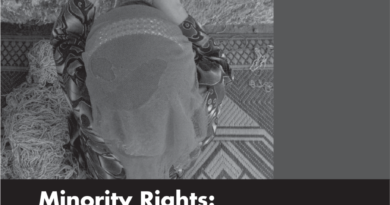18 December-Minority Rights Day
18 December-Minority Rights Day
Minority Rights Day
Every year on December 18th, India dedicates a day to safeguarding and protecting the rights of minorities. This day is dedicated to increasing awareness of issues affecting minorities and their safety, as well as boosting knowledge of those topics. The Declaration on the Rights of Persons Belonging to National or Ethnic Minorities, Religious and Linguistic Minorities was approved by the United Nations General Assembly on December 18, 1992. The basic purpose of the United Nations was to promote and encourage all people, regardless of race, gender, language, or religion, to respect human rights and fundamental freedoms. Each state government formed State Minorities Commissions in their respective capitals. It is the responsibility of the State in question to notify any community unique to that State as a minority community within that State.
Significance of National Minorities Rights Day
Every year on December 18th, India commemorates National Minorities Rights Day to preserve the rights of minority populations. The Indian Constitution ensures that all persons have equal rights and includes measures to protect the rights of linguistic, ethnic, cultural, and religious minorities. It also helps individuals who are economically or socially disadvantaged, regardless of caste, culture, or community, including specific tribes and castes.
Aim of National Minorities Rights Day
In India, National Minorities Rights Day is held to protect the rights of minorities. This day also focuses on increasing public awareness and education about issues affecting minorities and their safety.
National Minorities Rights Day
The National Commission for Minorities in India commemorates National Minorities Rights Day by promoting religious harmony, respect, and a better understanding of all minorities’ communities. On December 18, 1992, the United Nations adopted and aired the Statement on the Rights of Individuals Belonging to Religious or Linguistic National or Ethnic Minorities. The proclamation from the United Nations emphasizes the cultural, religious, linguistic, and national identity of minorities, which must be recognized, safeguarded, and protected by nations and specific territories.
The Ministry of Minority Affairs was created on January 29, 2006, when the Ministry of Social Justice & Environment was split up to ensure a more targeted response to issues affecting the registered minority communities, which include Muslims, Christians, Buddhists, Sikhs, Parsis, and Jain. In order to benefit
About National Commission for Minorities
The National Commission for Minorities (NCM) was created in 1992 by the Union Government. Muslims, Christians, Sikhs, Buddhists, and Zoroastrians were the first five religious sects to be designated as minority groups (Parsis). Jains have also been designated as a minority community, according to the notice information dated January 27, 2014.
Constitutional Provisions for Minorities:
The following clauses of the Indian Constitution need protections to protect minorities’ interests:
- Discrimination against citizens on the basis of religion, race, caste, sex, or place of birth is prohibited.
- Citizens’ right to equal opportunity in matters relating to employment or appointment to any State office, and prohibition of discrimination on the basis of religion, race, caste, sex, or place of birth in this regard.
- People’s right to free expression, practice, and propagation of religion — subject to public order, morality, and other Fundamental Rights.
- Every religious denomination or section thereof has the right to establish and maintain institutions for religious and charitable purposes, manage its own affairs in matters of religion, and own and acquire movable and immovable property and administer it in accordance with the law, subject to public order, morality, and health.
- People’s right to attend religious instruction or worship in educational institutions that are entirely maintained, recognized, or aided by the government.
- Non-discrimination in admission to any educational institution sponsored or aided by the government based solely on religion, race, caste, or language, or any combination of these factors.
- All religious and linguistic minorities have the right to create and run educational institutions of their choosing.
- State regulations requiring forcible acquisition of minority educational institutions’ property must ensure that the compensation amount paid does not limit or abrogate the rights protected above.
- Discrimination against minority-run educational institutions when it comes to getting state financing is prohibited.


